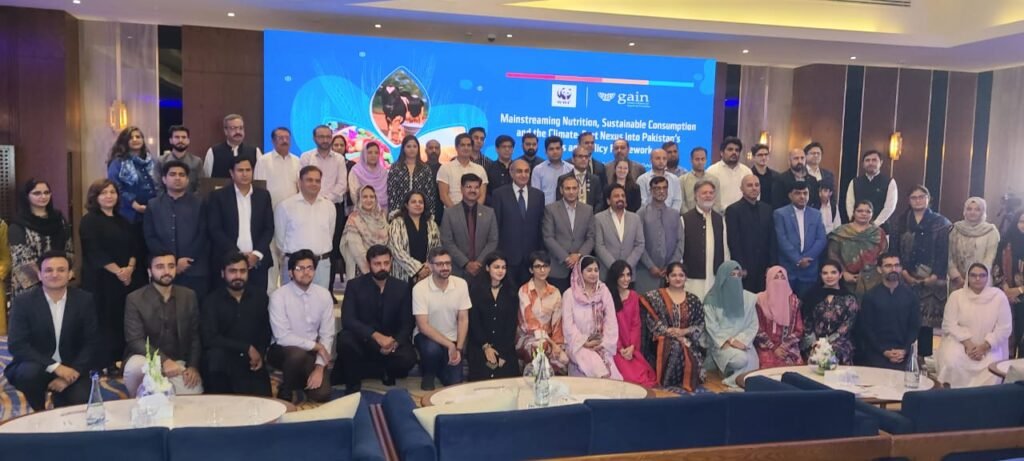
Agriculture both contributes to and is impacted by climate change, Dr. Masood
Islamabad : Climate change is one of the most pressing global challenges, with far-reaching consequences for nutrition and food security. Experts at a workshop titled ‘Mainstreaming Nutrition, Sustainable Consumption and the Climate-Diet Nexus’, emphasized that climate change disrupts food systems and compromises the nutritional quality and availability of food. They stressed that while Pakistan has policies linking agriculture, food security, and climate change; traditional practices still dominate. Experts noted that limited access to technology, economic constraints, and skill gaps among stakeholders hinder the transition toward more sustainable and nutrition-focused agriculture.
Pakistan’s key experts on food, climate, and nutrition gathered for a crucial discussion aimed at weaving together two of the country’s most pressing issues: climate change and nutrition. Hosted by WWF-Pakistan and the Global Alliance for Improved Nutrition (GAIN), the event marked a major step forward in connecting sustainable diets with national climate goals. With Pakistan set to revise its Nationally Determined Contributions (NDCs) later this year, this workshop brought urgency to integrate climate change and food systems through dialogue. Policymakers, researchers, and food industry leaders proposed actions that can help transform food systems, not just to feed the nation, but to save the planet.
Dr Masood Arshad, Senior Director Programmes, WWF-Pakistan, noted that the agriculture sector is both on the receiving and contributing ends of climate change. Thus, to reduce carbon emissions from agriculture and create a more climate-resilient system, it is important to design transformative action plans that align with domestic policies and international commitments and ambitions. He added that to address the interconnected challenges of food systems and climate resilience, we need to enhance the multi-sectoral partnerships at the national and international levels. He further called for breaking down policy silos and integrating climate-smart, nutrition-sensitive approaches that protect people and the planet.
Shafqat Abbas, Deputy Secretary, Ministry of National Food Security and Research, Government of Pakistan, called for integrated efforts across the food, health, agriculture, and climate sectors to enable Pakistan to develop nutrition-sensitive, climate-resilient strategies within its NDCs and broader policy frameworks. He further called for stronger coordination and alignment among key ministries and stakeholders at both the federal and provincial levels to ensure effective implementation.
Dr Faiz Rasool, Head of Policy and Advocacy at GAIN, emphasized that Pakistan has an incredible opportunity to stack its climate and nutrition ambitions, particularly through the revisions of its NDCs. Nutrition-sensitive climate action is not only a policy imperative but also a powerful human development accelerator. He further said that this workshop signaled a shift from fragmented responses to integrated solutions that deliver for both people and the planet. Rasool also highlighted GAIN’s commitments to drive evidence-based, multi-sectoral solutions for putting affordable, healthy diets at the centre of climate adaptation strategies.
A multi-stakeholder panel discussion, with speakers from the Ministry of Climate Change, World Food Programme, Asian Development Bank (ADB), and Pakistan Agricultural Research Council (PARC), weighed in on how cross-sectoral coordination could fix broken food systems in the face of extreme weather, inflation, and food insecurity. In parallel, private sector giants such as FrieslandCampina, Engro, Unity Foods, Karandaaz, and Dawn Foods also took center stage, showcasing how businesses are stepping up with climate-smart products, fortification strategies, and scalable innovations.
The event ended with a clear call to action to tackle the dual challenge of rising temperatures and rising hunger through strategic recommendations for resilience and reform. A national policy brief, designed to feed into Pakistan’s revised NDCs will also be published in the coming days.







